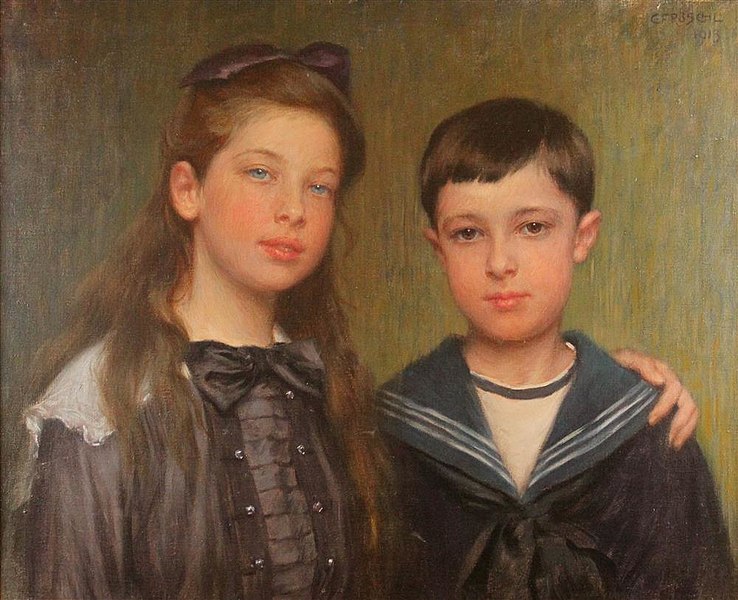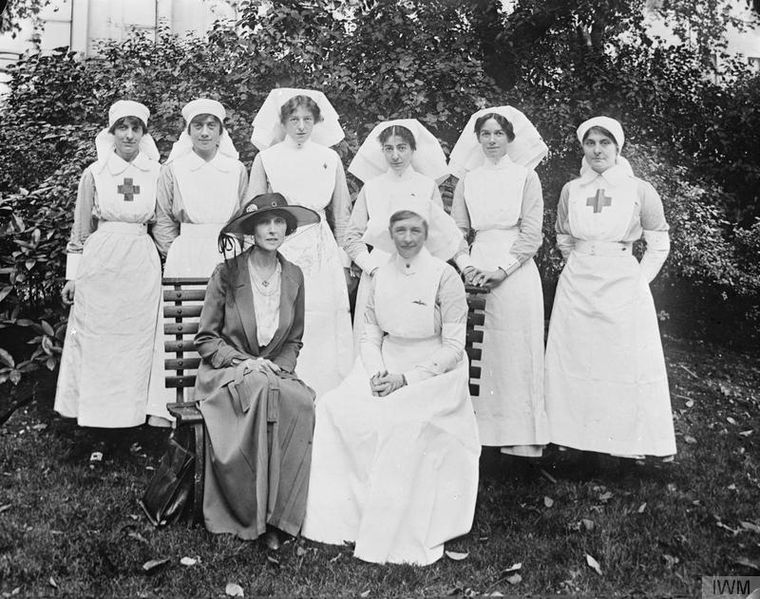 Giant’s Bread: “It was New Year’s Eve.”
Giant’s Bread: “It was New Year’s Eve.”
Main Character: Vernon Deyre
Published: April 1930 (14th published book)
Length: 437 pages
Setting: various: Abbots Puisannts, London, Germany, Holland, Moscow, New York, etc.
My chronological Agatha Christie read continues with Giant’s Bread, her first novel published under the pseudonym, Mary Westmacott. There is no detective work in this story, as Christie/Westmacott treats her readers to a very modern novel. In any case, it must have been a much needed break from the detective novels Christie was expected to write.
Covering a vast number of characters and spanning a few decades of years, this first contemporary novel written under a pseudonym, proves Christie wanted this genre of her writing judged on its own merits instead of being buoyed up by her previous successes.

Siblings (1913) Carl Fröschl ~ source Wikimedia Commons
Vernon Drywer grows up in Abbots Puissants, an estate in the countryside in England, with a withdrawn father and overdramatic mother who has a tendency to slather him with affection without any sincerity behind it. Jo, his cousin, is part of his childhood, as is Sebastian Levinne, a neighbourhood Jewish boy and Nell Vereker, a thin child who visits occasionally. Another more obscure character is called, “The Beast” which is the terrible feeling that is inspired in Vernon whenever he hears music.

Vernon, Jo and Sebastian remain friends into adulthood when their lives take them to town. Jo has become frantically involved in her “causes”, Sebastian is busy making money in his ventures, and Vernon is slowly discovering that music is part of his soul in spite of the effort he has made to avoid it.
The story progresses as Vernon courts Nell in spite of his attraction to Jane, a sultry singer whose personality is somewhat of an enigma, Sebastian is in love with Jo in spite of her adversion to his business success and therefore him, and Nell cannot decide whether she wants to marry Vernon who, in spite of his country estate, is poor, or George Chetwynd, a wealthy American who though much older, vies for her hand in marriage.

Hospital Staff (First World War) ~ source Wikimedia Commons
A tapestry of bad choices, unfortunate circumstances, and finally the First World War colour the lives of each character and they navigate them according to their characters and life experiences. Thus follows a number of dramatic occurrences, and improbable situations that drive the story at a breakneck pace. I can’t reveal more without exposing some of the plot cliffhangers that Christie delivers with surprising regularity. Music was the background theme which was woven throughout the narrative and ended with an epistolary burst at the end of the novel, dumping a musical philosophy upon the reader with an unsettling speed. I can’t say the ending of the novel was satisfying but given the whole of the novel, it was perhaps expected.

Music (1904) Thomas Eakins ~ source Wikimedia Commons
I was nearly beside myself with happiness and relief when I finished this book and could move on to her next mystery. While I appreciate Christie’s attempt at a modern novel, it’s exactly the type of book that I dislike reading, full of angst and bad choices and characters who one wants to try not to emulate, as they never seem to grow or change. Not to mention the drama; there was entirely too much drama for me. One critic in a 1930 review noted, “Miss Westmacott shows narrative talent; but would presumably be more original if she strained less after originality.” I’m not sure if that would be my conclusion as to the unsettledness of the novel. Reading it felt more like a racing around of occurrences, which perhaps stems from the form Christie was used to when writing detective novels. Overall, I desire more subtlety: instead of a rollercoaster ride where very little is fully examined, I prefer a leisurely cruise down the river to be able to view and enjoy the natural setting.
To give Christie her fair due, there is art and creativity in this novel. Her prologue is sufficiently mysterious and striking to draw you into the story. She portrays different character types and gives the reader a look-in at some of the aspects of WWI through Nell’s job at the hospital. She also examines love and marriage and makes an interesting commentary by juxtaposing a marriage between people for passionate love and a marriage between people who have an affection for each other but also (and perhaps more importantly) like minds who are able to understand and accept one another. Much of her philosophy of music passed by me, perhaps because of the unevenness of its place in the story, but at least it was there and an attempt to explain it made; the Beast is readily understood. I also liked the comparison of people with simpler lives with those who possess wealth and have all their wishes granted, the former being lighter and happier and more contented and the latter facing more challenges and trials and angst. I must say, I did very much enjoy the beginning of the novel describing Vernon’s childhood, but as it progressed it was readily apparent that it just wasn’t the book for me.
I must admit I feel that this review is somewhat disjointed but it follows the flow of Christie’s writing and therefore I feel satisfied. One thing I’m still puzzling over thought is the title. Does anyone know the significance of “Giant’s Bread“?
Now on to the next novel, Christie’s first one starring the beloved old lady, Miss Marple, The Murder at the Vicarage. I’m soooo looking forward to it!



a slight thrill of anticipation when i see one of your posts in my mailbox! and this one is thoroughly readable and informative as usual… i’ve several Westmacotts on the shelf but have never indulged; possibly i’m saving them for something: i can’t say a rainy day because there’s lots of that on top of all the snow. here’s hoping it will all go away and bicycling will once more be in the cards… how much do you have?
Mudpuddle! So good to hear from you! And thank you for the nice comment. I wish I was posting more but just getting some time for reading is a challenge. However, I’m starting the year off focussed so that’s a positive.
Well, I must say that I wouldn’t recommend this book unless you have nothing better to read. It’s rather depressing with all the love triangles and poor judgement. Even the successful characters don’t appear to be very happy. It’s interesting to investigate Christie’s writing an another genre but that’s about it.
Can I admit that I’ve been enjoying the snow. We’ve probably had a foot overall with a little melting before Sunday. I didn’t like the cold temperature snow (between -8 and -11ºC) because it was so frosty and didn’t hold together well but between -4 and about -2ºC it’s been perfect. We were out skating on a huge frozen pond for at least 4 days in a row and it’s been so much fun! Sadly the warmer temperatures arrived on Sunday and most has melted although it’s still been snowing on and off a little bit. So yes, I will enjoy the biking weather but I’m loving the snow too.
I’ve never read any of the Mary Westmacott novels–sounds like maybe that was wise! The Murder at the Vicarage on the other hand…I can see why you’d be looking forward to that. (And I assume you’ve already read it at least once.)
Happy New Year!
Your life won’t be less rich if you never read a Westmacott novel, I would guess. 😉 Although perhaps I shouldn’t be too hard on her until I try another.
I read The Murder at the Vicarage eons ago but I’ve seen the A&E production of it numerous times as it’s one of my favourites. I can’t wait to read the book!!
I’ve been kind of meaning to re-read this one because I remember it as so weird. I’ve always figured that the title is probably based on the giant in Jack and the Beanstalk — “I’ll grind his bones to make my bread.” So giant’s bread requires destroying human lives.
I just kept thinking to myself, “thank goodness I’m not one of these characters”. It’s certainly not an uplifting book. Thanks for the explanation and it makes sense but I don’t think Christie did a very good job of tying it to the story, unless I’ve completely missed something.
Hi Cleo! Good to see a post from you 😊
I read her ‘A Daughter’s a Daughter’ about a year ago – ‘A bittersweet tale of possessiveness and jealousy,’ which was maybe a smidgen better than the one you read. I’d prefer her detective novels any day!
Thanks, Carol! I must say I’m not looking forward to the next Westmacott novel and can only hope that it’s better than this one. I’m glad that I’m back to the good old mystery novels!
Of the Westmacott novels, I really like Absent in the Spring. That one stuck with me.
Thanks for giving me a Westmacott to look forward to!
Fascinating, thanks for your review. I still wonder if I’m going to read more by her this year, after finishing the while HPoirot canon. You are tempting me, lol
I think the Miss Marple reads are wonderful and her Tommy and Tuppence novels are some of my favourites. But, from what I’ve read/heard, you could definitely miss the Westmacott novels and move on to something much more enjoyable. Hope 2022 is a fabulous year for you, Emma!
This novel seems like an attempted hybrid between Edwardian novels and stream of consciousness kind of writing. I totally understand your relief at getting done with it and characters we do NOT want to be! Let’s stick to Christie mystery!
p.s. I echo Mudpuddle about the thrill of seeing your post!
It’s like an extremely depressing and serious Stella Gibbons novel. Gibbons’ novels work because she often pokes fun at her characters. Christie does NOT, at least, not in this one.
I’m sorry! I’ve been off skating on ponds and having a peaceful holiday. I do hope to post more, but first …… READ! 📚
I associate Christie so much with mysteries that I’m not sure how I’d feel about one of her non-mysteries. Although, I do admit to a certain curiosity. I left these off my Christie reading list, at any rate. 🙂
(Oops, hit the wrong button before finishing!) I find that I don’t have an aversion to reading these sorts of stories (people making bad choices), necessarily, if they’re well done, but have to be in the right mood for it.
I’d be interested to hear what you think if you ever do read one. There was nothing much good going on in this one and nothing to learn. It wasn’t my cup of tea.
Pingback: The Murder at the Vicarage by Agatha Christie - Classical CarouselClassical Carousel